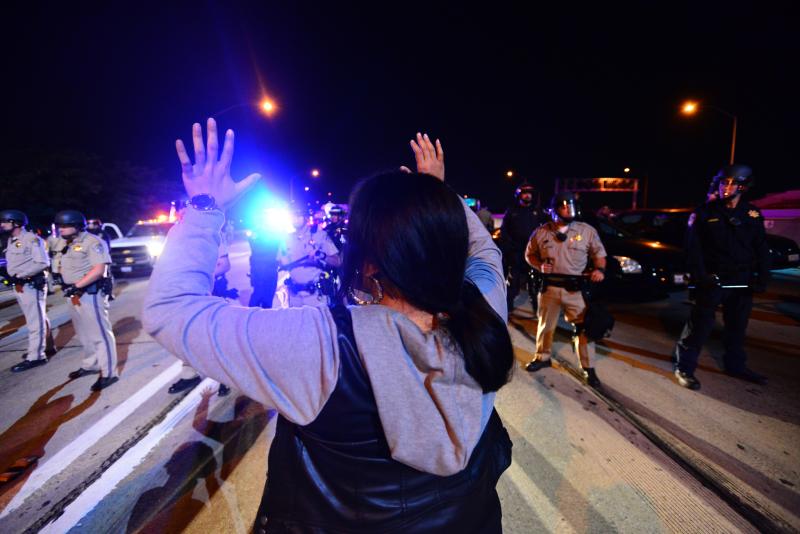Ferguson's Movement: Perspectives of a Former Cop and On-the-Ground Organizer

The report found Ferguson police has a pattern of using disproportionate force against minorities and also found racist emails between officers, resulting in the resignations of Capt. Rick Henke and Sgt. William Mudd. The report concluded that “law enforcement practices are shaped by the City’s focus on revenue rather than by public safety needs.”
Ferguson police have been under national scrutiny since the killing of Mike Brown last August. Widespread protests against the decision to not indict former officer Darren Wilson garnered huge media attention.
In the meantime, activists continue to press for change.
I spoke to some involved in the movement about the DOJ’s findings and the larger issues they uncover, as well as their experience being politically involved.
Former Cops Against Police Brutality
Alex M. Salazar served a decade in the LAPD, including a year in Rampart Division, later scandalized following revelations of rampant misconduct, criminality and abuse. He is now a member of the National Coalition of Law Enforcement Officers for Justice, Reform and Accountability (NCLEO). The group went to Washington D.C. two weeks ago and met with members of Congress to discuss police brutality.
"We know there has been institutional racism in law enforcement,” he said. “Some cops go, ‘Oh, you don’t know what it’s like.’ Well, we do know.”
In fact, the trauma and disillusionment Salazar experienced as a cop motivated him to organize. During the second year of his career, he witnessed a robbery while off-duty. He ran to help, but was attacked, and in the resulting chaos he was hit by an unrelated car. It deeply affected his psyche.
The “macho culture” that surrounded him, however, discouraged openness about psychological distress.
“It’s taboo,” he said. His co-workers would instead “ask, ‘Why didn’t you shoot him?’ or, ‘Why’d you get involved?’”
READ MORE: On Black Lives Matter: An Interview with Patrisse Cullors
He also saw a psychologist during this time, who refrained from telling him he had Post-Traumatic Stress Disorder until after he left law enforcement. Salazar, the psychologist explained, would have been placed on the “rubber gun squad” (desk duty) had the diagnosis then been made.
“If I can’t handle it, they’ll take my gun away,” Salazar said. Traumatized and psychologically unfit officers were allowed to remain on duty to avoid a political fallout. “No department wants to admit they have a ticking bomb who might explode.”
Divorce, alcoholism and suicide rates among police are higher than for the general public (more info here), and Salazar knew six fellow officers who committed suicide. Over time he became, like others around him, “an angry cop” with an “us versus them” mentality.
Before the Rodney King riots, he explained, “it was normal to beat people [at the termination of a pursuit] to teach people the lesson you don’t run from police.” Abuse included racist taunts and targeting of minorities.
“When I was a police officer, we used to racially profile. ‘Oh, he looks dirty.’” Some cops, he said, “almost become gang-bangers themselves,” and when asked if he believes the LAPD is different today, he said that while some elements have changed much has remained the same.
Salazar committed himself to positive change after leaving the LAPD in 1998. This past year, he has been to Ferguson three times, met and interviewed the family of Tamir Rice and recently spoke with U.S. Representatives John Lewis and Sheila Jackson Lee. He says the representatives indicated they would have a Congressional hearing about police brutality sometime this year.
Activism in Ferguson Today
Emmaculate Jones is a St. Louis native and organizer on the ground in Ferguson. When asked about the DOJ’s recent report, he laughed, “We already knew that.” His group, Black Souljahz, will along with numerous others host the upcoming “Ferguson Spring,” a weekend of community repair this May in Ferguson.
“The whole reason we first came out was because Michael Brown got killed,” Jones said.
Although he’s grateful for the attention those protests received, Jones feels the media focused too much on just Brown. “Day by day people are getting killed by the police.”
READ MORE: LAPD Body Cameras Could be 'A Cop-Out' Say Angelenos
When coverage waned, new tactics replaced standard picketing and marches. In an attempt to counter neighborhood gentrification, they now buy vacant homes, restoring and leasing them for a decent rent.
What isn’t offered up for rent will be opened as a community space. In addition to their two other properties on the city’s west side, his group also recently purchased an acre of land to build a community garden.
Their goal is to “bring the neighborhood back to the hood.” But, he clarified, “This is not a reenactment of the civil rights movement.”
Where others have sought specific policy changes, like putting body cameras on police, Jones and his group want to create “a real revolution,” bringing neighborhoods under the control of their participants. “We don’t need the police, we can police ourselves.” Ferguson Spring aims to further that goal.
With many driving or being bused in, attendees of the event will come from across the country. It was intentionally planned for the weekend before Malcolm X’s birthday in order to bring attention to what they hope will become a new holiday, Malcolm X Day.
The four day event will include educational workshops; a “Back to the Hood” parade and barbecue; and a “Day of Love” on which giveaways (like free haircuts) will be distributed in impoverished neighborhoods. On Malcolm X Day the following week protest actions are expected to occur nationwide.
The Movement's Trajectory
Disparate groups working on similar problems bubbled up out of last year’s unrest in Ferguson. However, the movement has no organizational center or common goal. Some prefer to work within the system while others seek to dismantle it.
What they will ultimately achieve with their undeniable momentum is impossible to guess.
Reach Staff Reporter Duncan Gammie here.



